Volkswagen Says Gasoline Cars Consume More Fuel Than Tests Show; Company Suspends R&D Executives As Germany Opens Probe Into Former CEO

The Volkswagen group, battling a major scandal over cheating on emissions tests, announced Monday that its gasoline cars consume more fuel than lab tests claim. Meanwhile, media reports citing sources said Monday that the automaker had sacked several senior executives, including at sister brands Audi and Porsche.
An environmental group said Monday that it had found evidence that several new gasoline-powerd models of Volkswagen cars, as well as models from Mercedes, BMW and other automakers, consumed significantly greater quantities of fuel than lab tests claim, according to the Associated Press (AP).
Transport & Environment, a European environmental organization, said that it had found no evidence that the vehicles were fitted with the same type of “defeat devices” that were used to spoof emissions results in several million diesel-powered Volkswagen cars, but called on European Union authorities to broaden their investigation to cover gasoline cars as well. The organization said that the gap between test results for fuel economy and real performance rose to 40 percent on average last year, up from 8 percent in 2001.
Volkswagen’s board suspended the research and development heads of its core VW brand, its Audi arm, and the sports car Porsche division, sources told Reuters. Meanwhile, Audi reportedly announced that 2.1 million cars from the luxury brand came with the software designed to cheat on emission tests.
The defeat devices, which were revealed by the U.S. Environmental Protection Agency earlier this month, are a type of software installed on the vehicle that alter its pollutant output when it detects an emissions test being performed, but covertly switches off the environmental controls when the vehicles are being driven. European authorities later found that the level of pollutants emitted from affected vehicles was up to 40 times higher than regulatory limits.
The company's board last Friday agreed to put several employees on leave while it navigated the fallout of the emissions cheating scandal, which first emerged in the United States but has since snowballed to involve the company's operations in other parts of the world.
The company has lost over a quarter of its share value since last week and the company’s former CEO Martin Winterkorn stepped down, though he denied any knowledge of the wrongdoing. On Monday, the company's stock was down nearly 7 percent in Frankfurt markets.
The company now faces at least $18 billion in fines from U.S. authorities alone, as well as a slew of lawsuits from angered customers. Investigations have been opened in countries including South Korea, India and Norway. The German automaker has admitted that about 11 million diesel cars worldwide were equipped with the defeat devices.
© Copyright IBTimes 2025. All rights reserved.





















